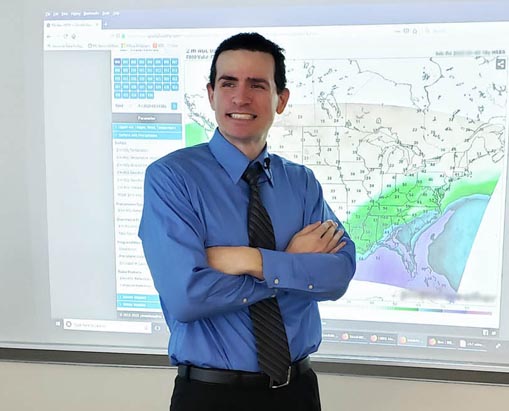What the IPCC AR6 climate report means for regular people
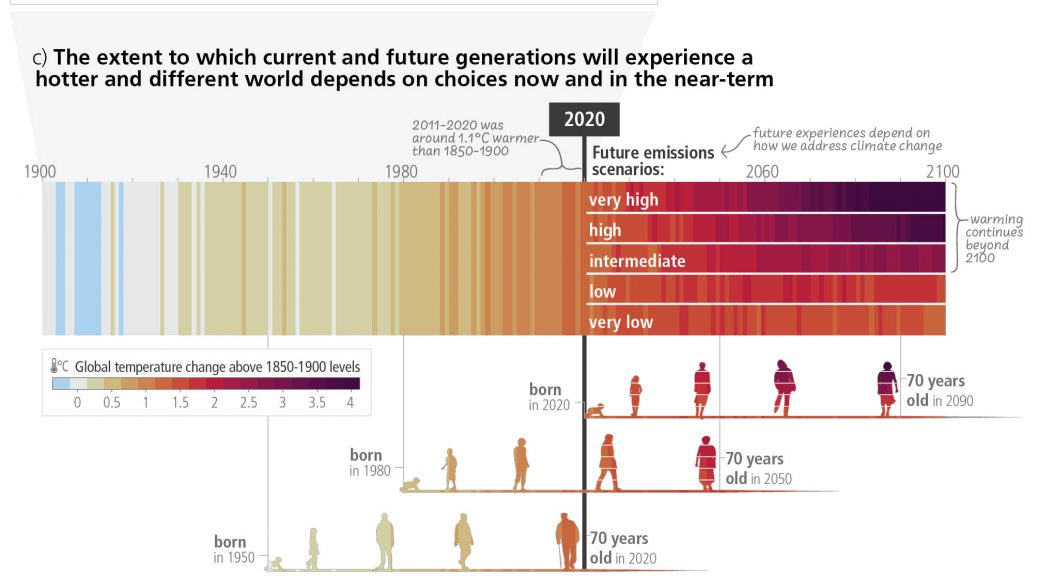
People will start to pay attention to climate change when they realize price gouging, high rent, wars, loss of income, and human health are linked to global warming. Companies have favored profit over people and the environment for decades. When you see the reports, the cause-effect relationship only grows stronger. Mass production, since the Industrial Revolution, has resulted in massive amounts of man-made emissions (the same corporations emitting are enjoying outrageous profits in the middle of this crisis). Emissions (pollution, gases) are not magic when they are released into the atmosphere. Besides the human health impacts of air and water pollution, these actions are leading to global warming. But it gets even more interesting – and frightening – with just a basic understanding of environmental science and climatology.
Earth’s Connected System
Earth’s atmosphere, geosphere, cryosphere, and biosphere are all linked. Changes in one will direct impact the others. For example, when humans tear up grass/dirt to construct a parking lot, mall, and start a massive city development, they change the heating characteristics of the surface (albedo). All across the world this has happened, including massive deforestation, over-reliance on inefficient cars, dirty energy, and outdated infrastructure – all in the name of profit with little to no consideration for people or the environment.
Inefficient dirty industry and outdated infrastructure means massive amounts of pollution are released into the atmosphere. Think of millions of dirty cars every day. What is released is not magic – those are gases and toxic to humans. Both primary and secondary pollutants continue to rise. Pollution is linked to heart disease, cancer, and death. Some places experience so much pollution it’s hard to see the horizon. These gases are not magic, not only do they harm human health, they change the behavior of the atmosphere. Some gases, such as carbon dioxide (CO2) and methane, cause warming. We are at a time when CO2 is at record amounts in the atmosphere, which has resulted in warming from man-made activities.
Critical Temperature Changes
Temperature changes over a relatively short amount of time can have deadly consequences for plants, animals and humans. Think of just a small fever in a human. An organism only has three options: adaption, migration, or extinction. If the temperature is too high for long enough, you either move or die. But plants can immediately do that. Plants are part of the food chain. If soil becomes unhealthy (not enough, too much water, or pH issues, for example), then you have no food chain. Similarly, the ocean uptakes CO2 and this results in acidity. If this goes on too long, think of all of the living things that will be destroyed – that’s the largest body of life on Earth.
You begin to realize the dramatic impacts of man-made global warming.
What is the IPCC?
The Intergovernmental Panel on Climate Change (IPCC) is a global community of government and science expertise that evaluate the current science related to climate change with the purpose of developing policy guidance to mitigate its impacts. The IPCC recently released its AR6 Synthesis report March of 2023. The report highlights significant findings on current evidence, measurements, models, and policy suggestions for leaders.
Climatology is the scientific study of climate. Specifically, climate means the average temperature and precipitation characteristics over significant periods of time (typically 30 years or more). It becomes critically important to study rapid changes in temperature and precipitation because of the change in such a short period of time (think of a human lifespan of 60 to 100 years). Climate is what allows plants to grow, people to work, oceans to flow, support life, regulate weather, and so much more. Climate is a part of life and if it gets too extreme (hot), damage occurs until things start to die. Signs of this happening are already measured/recorded all over the world.
That’s why it’s also a national security issue to study climate – it will impact every plant, animal, human, everything on Earth – all natural resources. To you and me, that’s our surrounding (environment). Big corporations should pay attention as well because it means loss of productivity and profit for them, ultimately.
The latest IPCC report says global surface temperatures are 1.09℃ higher in 2011-2020 than 1850-1900. The largest surface temperature increase was over land (1.59℃) than over the ocean (0.88℃). Global surface temperatures have increased faster since 1970 and any other 50-year period over the last 2,000 years.
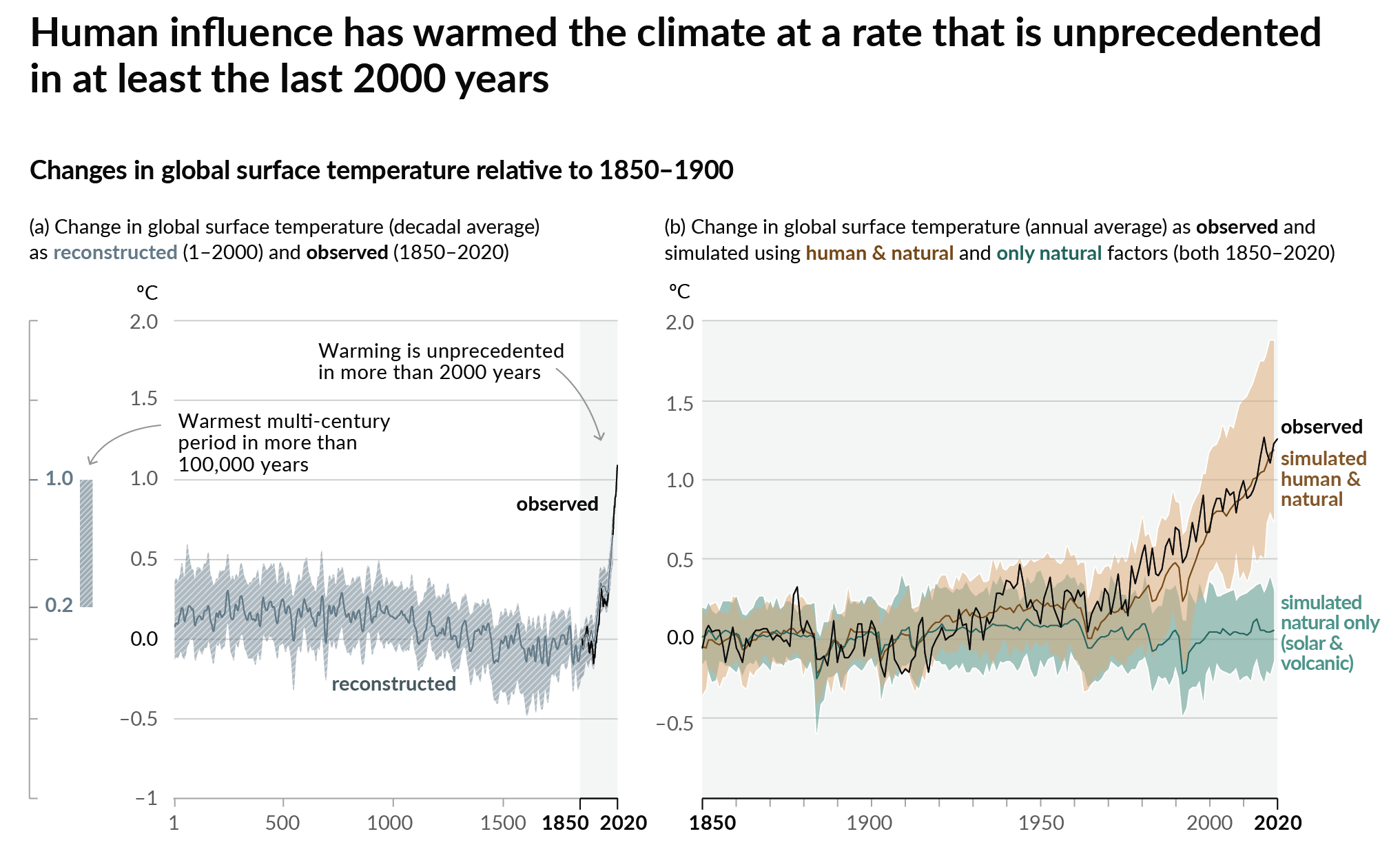
This warming is a direct result of greenhouse gas (GHG) emissions from human activities over the above period. In 2019, atmospheric CO2 concentrations were higher (410 ppm) than any other time in the past 2-million years. Methane (1866 ppb) and nitrous oxide (332 ppb) are also higher than any other time in the past 800,000 years. Gases like these have the effect (among other things) of heating the atmosphere.
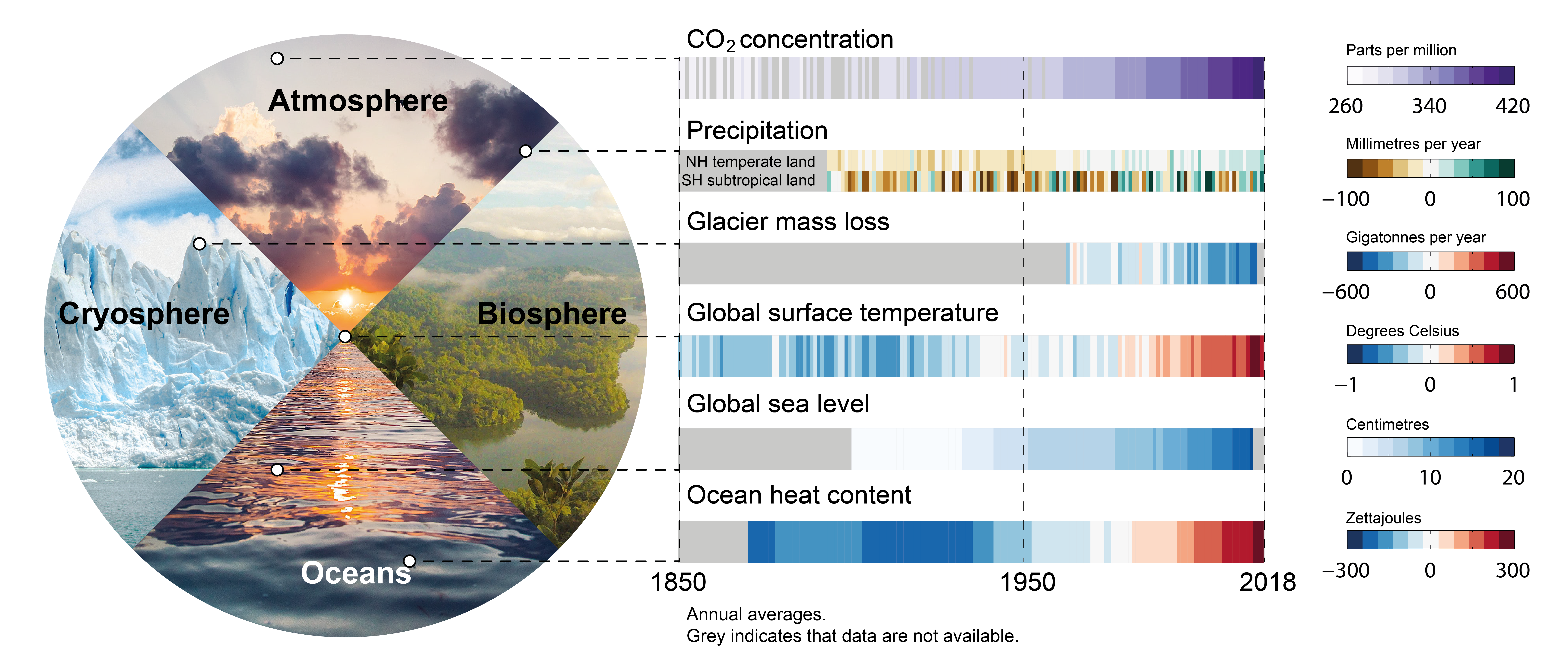
Such higher low and higher high temperatures, globally, have resulted in widespread changes to the ocean, atmosphere, cryosphere, and biosphere. All of these spheres are connected, they are our environment. Environmental science studies what happens to living and non-living things (all of the things in our environment) when changes occur in one or more our the spheres.
Extreme changes have included observed (measurable) events, such as heavy rain (flooding), heatwaves, tropical cyclones, and droughts. Scientists believe these kinds of extreme events have increased in frequency (specifically heatwaves and droughts), since the 1950s.
Human Impact – Global Climate Crisis
It is estimated 3.6 billion people are highly vulnerable to climate change. Corporate profits have meant profit was more important than people. Failed governmental policies across the globe have resulted in widely distributed variations of socioeconomic status and overall vulnerability to global warming. This means low-income populations are at most risk of anything from loss of job, land, home, food resources, and are likely to experienced associated negative health consequences.
Examples of the most vulnerable regions include Africa, Asia, Central and South America. They will be the first to experience the most extreme climate impacts.
More developed nations (like the United States) are also witnessing local climate change impacts. These impacts could result in economic destruction, loss of home, loss of farmland, increases in spreading diseases, and so forth. Ultimately, this will contribute to natural resource/land scarcity, war, destabilization, and mass movement of people towards livable areas.
Scientists have described our current state of human-induced global warming climate change, specifically, humans destroying the surface, deforesting, incredible amount of man-made carbon emissions/pollution, as increasingly causing irreversible losses to freshwater, coastal, and oceanic ecosystems. This is not a guess, it’s a fact that mortality events have been recorded in the ocean.
Because of the impacts of climate change, Earth’s surface and soil are being changed. This means a global food and water security crisis now exists. Droughts and flooding events will continue to damage food chains, ultimately leading to death, destruction, and displacement. Similarly, freshwater availability is being reduced. Freshwater is a necessity for survival.
Ocean warming and acidification is leading to changes in ocean ecosystems. This will directly impact fish, bait, food production and distribution, including local fishing economies.
We can expect to see more diseases spreading because of global warming. This happens, for example, through higher temperatures and flooding events. Such conditions help vector-borne diseases spread, including providing more favorable areas for mosquitoes.
Higher temperatures will result in uninhabitable areas of Earth. People simply cannot exist in areas with too high of temperatures. This will result in mass migrations and fights over land as people try to find somewhere else to live.
Keep in mind, we are also talking about dirty air and water — which is also linked to cancer, heart disease, asthma, and death. These emissions humans are releasing result in dirty air and water.
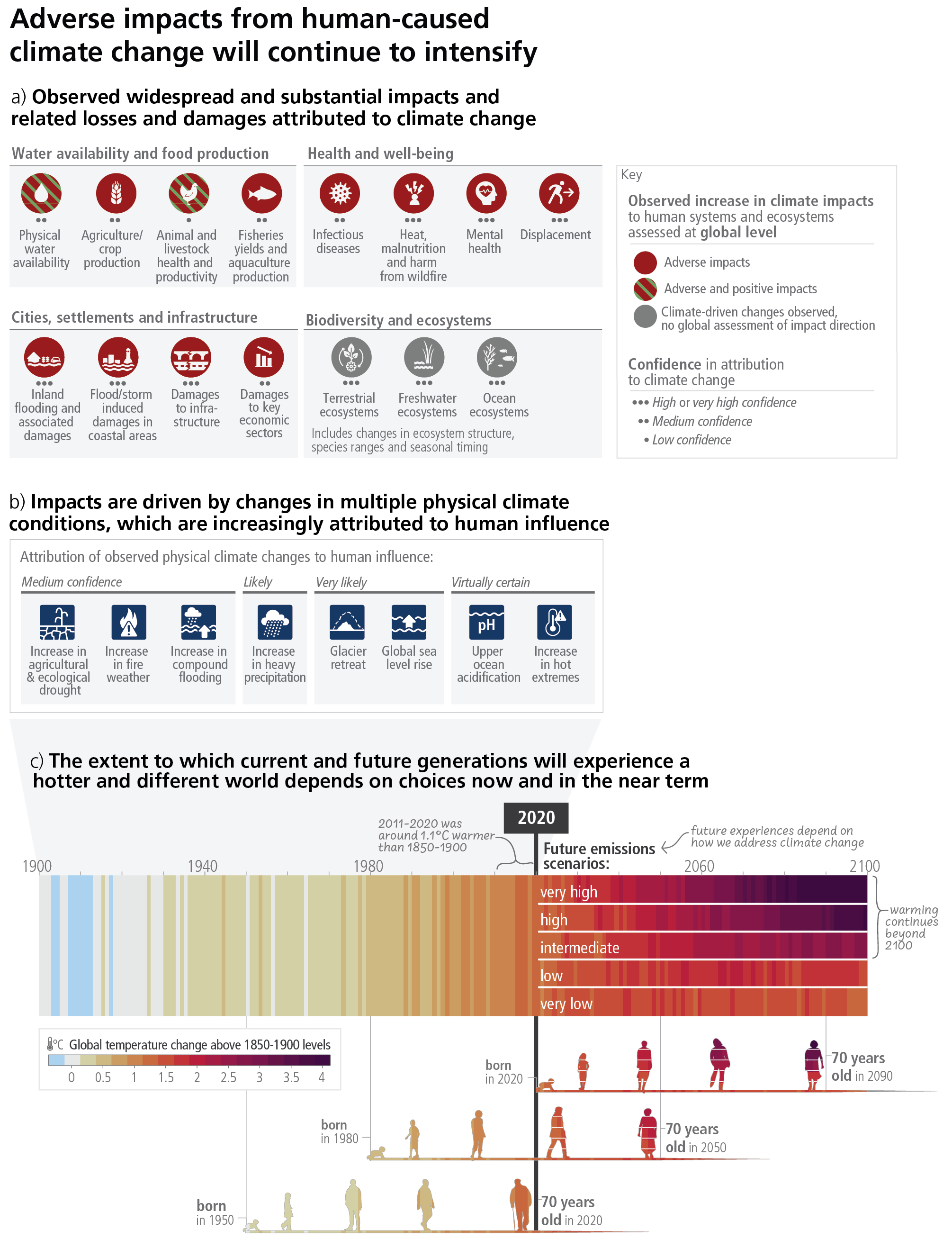
The entire biosphere continues to be greatly impacted by increasing GHG emissions. The impacts only get worse as more corporations/industries pollute, contributing to the warming and pollution mess. More amounts of land destruction, air and water pollution, and deaths will occur.
If governments continue to allow corporations to operate with the profit over people/environment model, the impacts of climate change will only get exponentially worse for the current and next generation of people. There will be exponentially more income, health, education, and resource disparities, globally.
Soon, between 2021-2024, increased CO2 emissions will very likely reach 1.5℃. And that’s even with very little emission of CO2, at this point.
But increased CO2 is good for plants, right?
This is a statement often used by science deniers that do not understand Earth is not an isolated backyard greenhouse with only a few pots of plants in it. Our Earth system is complicated. While increased CO2 may be good short-term for isolated lab growth of plants, Earth’s interconnected system does not work this way.
There are multiple other gases being released, photochemical reactions occurring, linked spheres interacting (cryosphere, atmosphere, geosphere, etc.), and oceanic uptake of CO2 results in increased acidity (which would eventually mean death for nearly everything living in it).
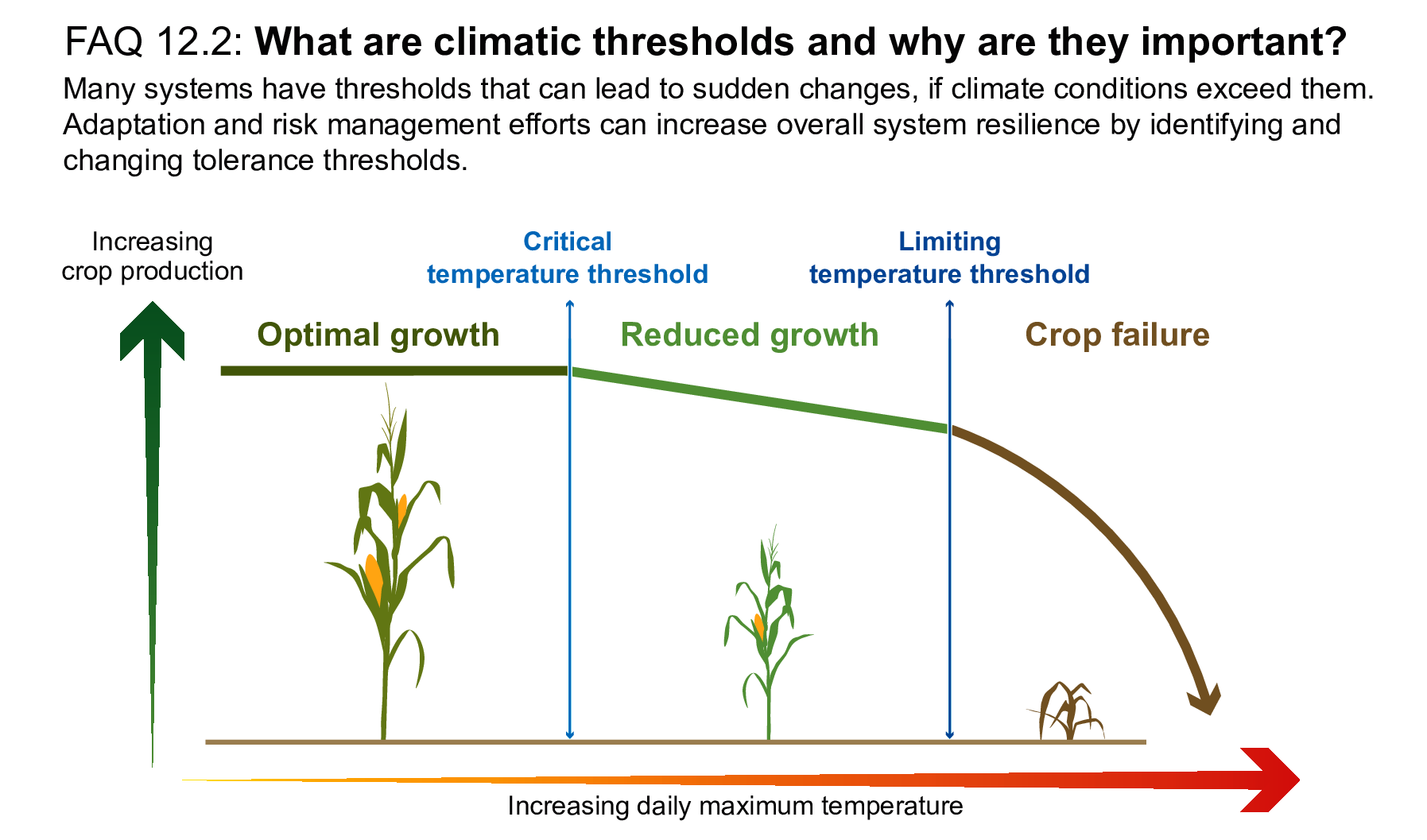
In context, ever-increasing CO2 is damaging and deadly to plants, animals and humans. It’s what comes with the CO2 increases, such as land destruction, changes in albedo, changes in buffer zones in coastal areas, the thermohaline circulation, saltwater intrusion, soil health changes, etc. Remember, much of our food starts with soil. If you make that unproductive/unhealthy, that’s part of the food production and distribution chain — you get deadly consequences. The ocean is the largest ecosystem on Earth. Change the pH significantly enough (acidity) and you destroy the food chain and global economy.
How do we get evidence?
Science is pretty amazing. For example, through dendrochronology (studying tree rings, some of which are thousands of years old), we can have an extremely accurate record of precipitation and temperature. Even though we were not there before, Earth’s spheres have a way of recording past environments. This is called proxy evidence because satellites and scientists with accurate measuring equipment (direct evidence) were not present millions of years ago.
Earth’s past is recorded very accurately in rocks, sediment, ice cores, glacial terminus, tree rings and much more. Together, evidence from all over the world is examined by scientists.
We can tell so much about the past through understanding of geology, climatology, meteorology, chemistry, physics, and other sciences. This is because scientific processes were the same back then as they are today, which means we can go back in time or forward (make predictions).
The evidence is overwhelming that man has played a direct role in contributing to global warming through their activities. No matter how late we are to responding to this global emergency, immediate action must be taken to secure our land, air, and water resources. This is to protect ourselves (currently) as well as future generations.
What do we do now?
Fear, Hope & Our Future
We are late in the game, especially with various political leaders favoring profit over people and science.
Real death and destruction are already occurring, due to man-made climate change impacts. What we are doing has caused so much destruction, which has only now been seen and realized by the public, thanks to the internet and modern video/photography devices.
All of those cars, factories, and decades of mass production activities have released outrageous amounts of pollutants into the atmosphere. Countless lawsuits and millions of deaths have already occurred because of air and water pollution. Meanwhile, the same corporations and leaders responsible for harmful environmental/people policies are enjoying record profits.
We are living in a dirty carbon profit world. The emissions are not magic, gases behave a certain way in the atmosphere. We know warming is going on and humans have polluted for some time. Real impacts mean rapid action is needed, especially among nations and the largest corporations, which represent the bulk of failed policies and top pollution/damage sources.
Remember the old reduce, re-use, recycle campaigns of the 1990s? Those surface solutions seemed to shift blame towards individual consumers, rather than focus on massive inefficient profit-based production and distribution infrastructures around the world. Our solutions must be practical, affordable, promote equality and justice for all. Our solutions involve both the producers (mass production industry/corporations) and consumers (individual people).
Large corporations have monopolized and marginalized millions in the name of profit. Besides the regular reports and lawsuits over illegal dumping, pollution, contamination, and infrastructure failures, companies are directly harming people by their very practices and influences, which are both bad for people and the environment.
And don’t blame one country over another. For example, some blame China and India because of the massive amount of pollution produced there. However, Americans consume those products they make overseas at our department stores right here at home. Essentially, this is a profit over people issue, where corporations are even using slave labor in horrible dirty working conditions.
The people producing consumer goods live in dirty production areas while the consumers never get to see those ugly conditions, just a shiny product box at a store. For decades, this has damaged the real focus individuals should have – electing officials that focus on people and environment over profit.
Green, cleaner energy could mean more people paying no power bill, not needing gas, oil changes, or insurance, which is one reason why mega corporations lobby against it – they want to keep raising prices for consumers (more profit is more important than the environment). Think of what it would mean for people to not have to pay for car loans, insurance, gas, monthly home power bills, etc. You can see how domestic issues that directly impact the individual living paycheck to paycheck are related to the climate change crisis.
We have mitigation options, such as wind and solar energy, infrastructure upgrades to make our existing grid more efficient, demand-side management, improved foresting practices, better crop/farm management, reduced consumption, people over profit policies, clean and water policies, reduced food waste, and funding for the implementation, upgrade, education, and incentive to participate.
In addition to mitigation options, significant economic disparities exist across the world, which mean some people will need more help than others. This means they need affordable housing, transportation, healthcare, education, and infrastructure. These are all linked to efficient carbon management policies. Ultimately, the same global corporation and mega-profit system that makes life difficult for the millions living paycheck to paycheck are responsible for the bulk of failed policies that continue to contribute to rising air and water pollution, income inequality, health disparities, and an unsure future for this and the next generation.
If you were told you only had a few years or months to live, that’s reason to be concerned, alarmed, take action. Similarly, we have a proven-global crisis going on and we see, feel, hear, and experience it daily as we struggle to survive. Policy changes are needed at the national, state, city, and neighborhood level. We’re not talking small changes, but huge. Again, people and environment need to matter more than profit. So… this is not fear-mongering, it’s recognizing, acknowledging and responding appropriately to our climate reality.
At the same time, this will be a time of tremendous opportunity for everyone.
Some people don’t like to change to a new policy, adopt something new, until they realize life could be better. Imagine an environment with less air and water pollution, easier transportation, affordable housing/rent, guaranteed healthcare, education, and a reachable dream for all. Opportunities means new industries, no more 40-hour workweek, less traffic jams, less cancer, stress, debt, and more time to enjoy the environment. There are lots of possibilities here, even for corporations to make massive profits off of doing “the right thing”.
This means it’s perfectly ok to be concerned about this climate emergency and at the same time, have hope, be excited, ready to take action, try something new, and to focus on electing leaders who value science, happiness, equality, and quality of life more than profit.
Sources
AR6 Synthesis Report: Climate Change 2023 (2023). Retrieved from: https://www.ipcc.ch/report/sixth-assessment-report-cycle/
More about author.
